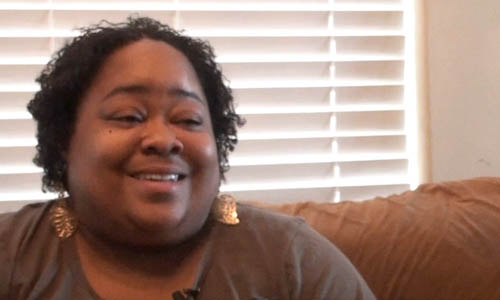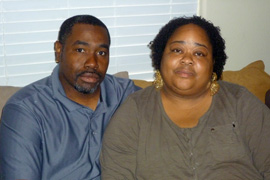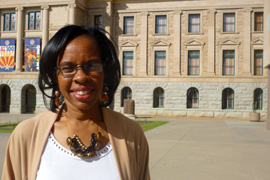Cronkite News has moved to a new home at cronkitenews.azpbs.org. Use this site to search archives from 2011 to May 2015. You can search the new site for current stories.
Lawmakers push to eliminate obstacles in adoption process
TOLLESON – The sounds of laughter and Christian music filter through Pleashette and Arthur Williams’ home. Eight children from ages 4 to 15 bustle about.
One of the younger girls sprawls on Pleashette Williams’ lap.
“I love you, mommy,” the girl murmurs.
“I love you too, sweetie,” Williams replies.
These children aren’t the Williamses’ biological offspring. The couple has adopted two of them and is seeking guardianship of another, who is a nephew.
Adopting the other five children, who are siblings, has been a journey of several years that included four months in which the Juvenile Court returned them to their biological parents, who had fought for custody.
“Having a kid for five years and this is their home, we are their parents,” Pleashette Williams said. “The youngest one we basically raised and that’s all he knows is us as his parents.”
A state lawmaker wants to speed up the adoption process in such cases. It’s one of three bills this legislative session dealing with adoption.
SB 1490, authored by Sen. Rick Murphy, R–Glendale, an adoptive and foster parent, would require judges to grant an adoption petition that would be approved otherwise if a child has been in an out–of–home placement such as foster care for at least 15 months and has been living with the prospective adoptive parents for six months.
The bill would require courts to grant petitions even if birth parents have appealed to have their rights reinstated.
For the Williamses, this bill could have prevented the five siblings from returning to their birth parents since they had lived with the couple for well over 15 months.
“Why do you wait for the parents to mess up again?” Pleashette Williams said. “You get tired – I mean, it’s what, five years? Something should have been done.”
The bill has won Senate approval and was on its way to the House floor.
Sen. Leah Landrum Taylor, D–Phoenix, an adoptive parent who co–authored the bill with Murphy, said it intends to help the kids find “forever families” more quickly.
“We’re waiting for the adults to get their acts together,” she said. “In the meantime, you have maybe another six months, another year, that these children have had their lives put on hold and pushed back.”
But Nancy Williams, a foster parent and board member for the Arizona Association of Foster and Adoptive Parents, warned that granting petitions based primarily on time lengths could rush the process unnecessarily. The Arizona Department of Economic Security, case managers or courts could be slowing the process, she said.
“Should the birth parent be penalized with a time limit because somebody else didn’t do their job?” she said. “I don’t think time should be the only factor.”
Landrum Taylor also authored a bill to allow prospective adoptive parents in the final phases of the process to refuse visits from the birth parents unless a court orders it. It would apply only to birth parents whose rights have already been terminated.
Landrum Taylor said her daughter suffered nightmares after the girl’s birth mother visited.
“All of a sudden having a visit, and it’s like, ‘Who are you?’” she said. “It’s a stranger. We’re talking my baby. She’s still in a diaper.”
SB 1100 won Senate approval and was awaiting action by the full House.
Christopher Alexander, a New Mexico child psychologist who specializes in adoption, said visits by birth parents aren’t always harmful.
“It’s a thorn in the side for the foster parents, and they wish Mom would just go away, but the reality is the kid and the mom have a bonded relationship,” he said.
Earlier this month, Gov. Jan Brewer signed into law a bill authored by Sen. Sylvia Allen, R–Snowflake, that eliminates a home study from the process if an adoption involves family members.
Before all Arizona adoptions, a case worker must do a home study, often called a social study, of the prospective adoptive family to investigate their history, living conditions, financial situation, etc. Until now, a judge has decided whether to require one when an adoption involves a relative.
The new law will apply if a child has stayed with the family for at least six months.
Robert Pizorno, a Phoenix man who brought the idea Allen, said it will help eliminate unnecessary expense and obstacles.
Pizorno took in his brother’s infant son in 2011 and began the adoption process soon after only to have it postponed because he received conflicting advice on whether a home study was required.
Some home studies cost thousands of dollars and may require home alterations afterward.
“It’s kind of intrusive, and while I don’t disagree with a home study for adoptions in general, for a family situation it’s so different,” he said.
Alexander, the New Mexico child psychologist, said the change carries risks because home studies identify safety hazards and make sure relatives, especially grandparents, understand what they are getting into.
“Let’s make sure this is the right place for this child even if it might mean that the kid has to sustain three placements rather than one,” he said.










